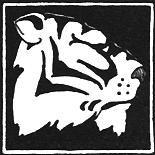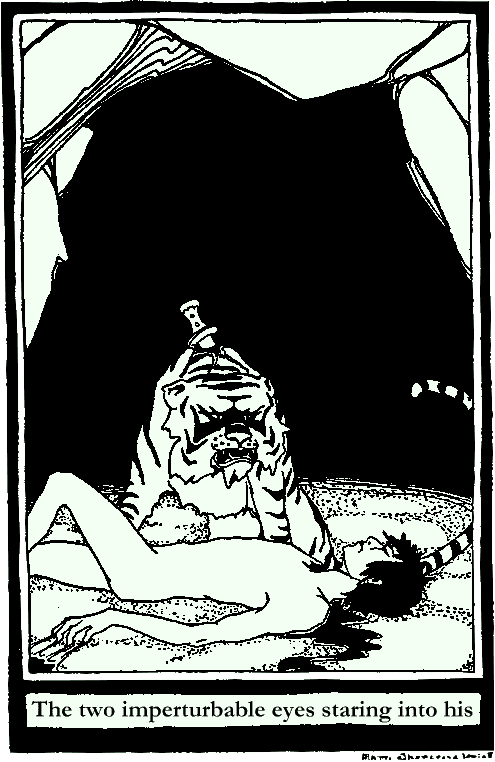 |  |
Wild at Heart Homepage | Contents | Previous Chapter
CHAPTER XVII
THE POOL
1

So, after all, there was a pool of water on the Ridge, and, it seemed, one only; for throughout the length of that great hog-back the red sun was mirrored but once. But it was enough. Hope was kindled again. Nanga was on his feet.
Strange that he should have missed it in his search! But there would still be light enough for his purpose, if he hurried; and hurry he must, for the time was due when his enemy would be starting on the nightly journey into the fens. And surely by water he must find, if not the tiger itself, some track of it at least. There was no guide like water, and the sand at the edge of water. The doings of all were written there, as well he knew; and it was with a strange confidence, as if he could read the message of that water from afar, that he started to find it.
It took but a few moments to scud down the grassy slope and regain the Ridge. Soon he was leaping from rock to rock, his lean body and flying hair sharply outlined against the red light; and then again, as he drew near, he was crawling, a shadow among shadows.
He had marked the spot--by a wind-blown tree, and a star, and a pointed rock--and it was well that he had done so, for in the welter of trees and boulders into which he had plunged he caught no second glimpse of the reflection. As it was, there were delays and doubts on the way, and the sun had already set at his back when he came to the edge of a deep, narrow chasm cutting into the side of the Ridge nearest to the river. Here his landmarks had led him. Tree and star and rock--they made this line exactly. Was the line true?
For a moment, as he peered down into the chasm, he feared that he had been misled. There was no sudden brightness of water, such as he had expected. Another dry watercourse, it seemed--no more; different from the others only in the deepness and the dimness of its bed. Yet this was the place. Landmarks could not lie. And he had seen water from up there.
He peered again, incredulously.
Then, suddenly, a glint deep down caught his eye. There was water; but it was black now, not red.
He could not have seen it by daylight, as he had come. He had worked up from the east, and on that side a huge boulder hung out over the pool and, as it were, roofed it, so that only a certain slanting ray from the west could catch it. By that ray, the last of day, he had seen it. Otherwise he might have leapt the chasm fifty times without noticing the water tucked away beneath his feet.
Even now he could not see it all. He had to climb down on to the very rock that roofed it, and peer round the corner, before he could make out the extent of the water. Then he saw that it was a spring-fed pool, with a tiny overflow trickling away over white sand to join--had he but known it--the very stream from which he had quenched his thirst every day of his life, the stream that girdled the lost garden. But he was not concerned with that. He had discovered something far more intriguing than the destination of a streamlet. At the base of the rock that roofed the water, the rock on which he was now lying, there was a cave.
A cave with a sandy floor! He could just make it out by craning his head over the side of the rock--make out the low entrance, but not what lay beyond. It might stop abruptly where darkness began, or it might eat far into the very fabric of the Ridge; he could not tell. There was a ring of inky blackness beyond which he could not see at all; but within the ring, even in that fleeting and uncertain light, he could see enough of the dim grotto to set his heart pounding. But even that was not all. The place reeked of tiger.
It had a curious effect on him--that pungent smell. It so enraged him that he was beyond fear or caution or any thought of himself. It mounted to his head and inspired him all of a sudden with that passionate fury which drives a terrier, red-eyed and bristling, into a badger’s earth; which drives a weasel to kill and kill for the sake of nothing but the killing. And, like terrier or weasel, he would have rushed in without a thought, drunk with the reek, had there not come throbbing at that instant out of the darkness under the rock the one sound that no living creature can hear and be unafraid.
It was the sound that made men shiver round their fires three good miles away, the long, deep, terrible “Aa-oong.”
2
The sound checked him, as well it might. It was as if he had received a physical blow; for the noise, imprisoned in a chasm, throbbing through hollow places. had all the fearful force of sudden thunder. It seemed to blast not only his ears but all his senses, so that his rage fell from him and for a time he was nothing but a helpless, terrified child at the mercy of a nightmare.
He could not persuade himself that the beast was down in the dim hole under the rock. It seemed that it must be crouching just at his shoulder. He dared not move forward or backward. Palsied for the moment, he lay on his face, flat against the rock, waiting only for the sound to shatter his ears again.
But he was spared that. There was a long silence--terrible, too, in a way--during which he forced himself to look down again. Then, reassuring in its very significance, there came another, lesser sound. Somewhere, out of sight in the dim recesses, the tiger was scratching itself.
It was that scratching that recovered Nanga. Though he knew well what was making it, he could not help thinking of an ape hunting for fleas. How often had he heard that laborious scratching in the watches of the night, up in the banyan-tree! The homely, familiar thought did more for his courage at that moment than all the houndings of revenge; incidentally, too, it led to an inspiration. Thinking of apes, he could not help remembering the apes’ invariable tactics. When they attacked, they attacked from above; never otherwise. They dropped like stones upon an enemy surprised. And, generally, they made good their hold.
From above: it gave a deadly advantage, even to the weakest. And that advantage was his, for clearly he had not been seen. A tiger had no teeth or claws in the back of its head; to bite and tear, it must roll over; and, before it could roll over, there must be one unguarded instant, one tiny pause during which it would be open to a mortal wound. That instant, that pause be longed to him, the attacker. His success, his very life, must depend upon the use that he could make of it. Here, then, the knife would come in. By the knife he would stand or fall.
But not yet. First his enemy must come out. Only when he could see the shadow of its head between him and the white sand at the water’s edge could he venture to drop from the rock. The head, and a little of the shoulders: he must think of nothing else, see nothing else; and, when he had made certain, drop plumb and bury the knife in the broad place just behind the head.
Something told him if he could find that spot, his enemy could not live long. But for a sure aim, there must be a little light. Now there was just enough light. But would it last?
He looked round. There was a fountain of red flame where the sun had been, but its edges were fast fading into purple, and he knew well low short-lived such brilliance could be.
Impatiently he looked down again.
There was still a sound of scratching, and with it an occasional thumping, as if the great beast were having some game with its tail. And, indeed, it seemed content, for now it was humming to itself, softly, as a cat purrs. Of movement he could see no sign. Even the outline of the cave’s entrance was now blurred. But he could till see the glint of the water and the pale circle of sand, and for some moments there would be hope. Some moments. Then, darkness--and another chance gone.
He was on tenterhooks. Night was so impatient; inevitable. He had been balked once, by the apes, and now it seemed that he was to be balked again by this giant of darkness, racing on great wings across the sky...
Ah! It had moved. It was coming out! No, it had only half risen, and then had lain down again and rolled.
Now it was licking itself. Stretching now.
He could see nothing, but by the sounds he could follow every movement. His excitement was almost intolerable. His teeth were chattering, and he could not keep his hands still. But he clung desperately to that one saving principle of his--that without seeing the head directly under him, he must not think of attacking. The head, the head; nothing else would serve.
He heard the tiger get up.
It was in earnest this time, and, he thought, a trifle suspicious; for it was prowling around the cave, which evidently reached far into the Ridge.
Now he could hear the purring very distinctly. Now it receded and he could scarcely hear it at all. Yes, this must be a big cave, for all the insignificance of the entrance.
The entrance. Why had he not thought of it before? By worming himself under the belly of the rock and clinging to whatever offered, he could hang right over the entrance. There he could hardly, even in a failing light, miss his mark. But he must get there quickly, while the purring was still faint.
He forced himself to act. Quick as thought, he stuck the knife between his teeth, and slipped round underneath the rock till he was directly over the opening. There he hung precariously, clinging by the toes and the fingers of one hand, grasping the knife with the other, eyes fixed intently on the pale rim of sand at the mouth of the cave, that darkened even as he watched it.
Nearer and nearer came the purring. Fainter and fainter grew the light. It was a race, a desperate race.
The purring ceased. Now there was not a sound in the cave.
Like the flame of a dying candle daylight was flickering. There was a moment when all light seemed to have gone, and Nanga despaired; and yet another moment when, from some obscure source, it burnt out afresh, a pale radiance strange to see. And it was through that last queer prank of the departed sun--that final fizzling out, as it were, of day--that Nanga saw for one fraction of a second what he had staked all on seeing.
Silently the tiger had come out. Silently it was standing just beneath him, head and shoulders filling the mouth of the cave. It was staring at the pool, or beyond the pool toward the dark path which it had never failed to take as night fell. Not seeking to drink; not for an instant shifting its gaze; but just staring into the dark with those cold, expressionless eyes--so he saw it in that moment of illumination, and trembled, for it was very huge.
Then, as the picture faded, he let go.
3
It was as if he had received a tremendous double blow in chest and mouth; or as if he had hurled himself on to a rock, and the rock had risen to meet him, and had smitten the breath out of his body. There was one long snarl of rage, terrible to hear. Then for a moment he was conscious only of the rank hide of the beast; then again, of something warm and wet spouting over his hand, of blood in eyes and nostrils. Last there came a confusion of fragmentary impressions, dream and reality mingled.
Now he was clinging to a tree, and a great gale had swooped down to hurl him away. He was being tossed all about. He was a leaf in the wind. But he must cling...cling...
He did not know now where he was, or what he was. He was nothing. He felt nothing, knew nothing, except that he had a hand which was clutching a knife’s hilt, and that the hilt was wet.
Now the tree was swaying. The tree was lurching under him.
The knife had been torn away, and half his body with it.
The tree had fallen, fallen with him underneath...
He was himself pinned to the ground, with a tiger standing over him...
That last was his only distinct impression of the fight. He awoke, as it were, from a tempestuous nightmare, to that one clear vision--the two imperturbable eyes, points of baleful green light, staring into his.

Of what had happened prior to that vision--of how the long knife had gone truly home between the shoulders, with such weight behind it that his own breast-bone had been broken; of how he had clung, spread-eagled along its back, while the great beast had raved, raved until the blood had flooded its lungs; of how, in the death-agony, it had flung him down and had torn his shoulder to ribbons--of all this he knew no more than a delirious man knows of his dreams. He knew only that at the last the immense thing was on its feet, staring into his face. It was the last fact that his mind registered before he fainted.
4
As the moon topped the hills, a pale beam stole across the floor of the cave.
It showed Nanga, lying on his back, with his eyes closed and a dark stain spreading under his limp right arm. There were other stains, too, on the sand; and, sprawling across it--half in, half out of the water--the huge hulk of the dead tiger. The chill wind of night was sweeping down the chasm, and somewhere falling water made a fitful splashing; but there was, none the less, a terrible immobility about the scene. Nothing stirred in the wind. There was no sign of the falling water. And the boy looked as dead as the beast that he had killed. Nor, through all the hours of moonlight and the darkness which succeeded it, did he once move.
But when dawn came, and the vultures began to cluster and to scramble upon the ledges of the rocks, he rose unsteadily to his feet and looked about him.
Dimly he saw the dead tiger, inert in the tainted water, lying just as it had collapsed after that last supreme effort to stand on its feet. Dimly, too, he realized that his hand had somehow brought this about. But he had neither the desire nor the strength to exult. There was no triumph in him. His blood, as well as his enemy’s, had drenched the sand; his shoulder was one open, throbbing wound, and that arm was useless; in his chest there was gnawing pain; the sickness of death was on him.
He lurched, sank to his knees beside the tiger, swayed as if he would fall into the water. But, as if the spirit that was in him refused to die here, he stiffened at the last and did not fall. On his knees he began to crawl down the sandy runnel which carried the overflow from the pool, blindly, wearily groping with one hand; following, without seeing, the slender trickle, because his mind was far away, fighting feverish battles in a terrible darkness.
His head was toward the lost garden nestling far below. For a dying instinct--the instinct that calls a wounded bear to its cave, a beaten fox to its earth--was leading him home.